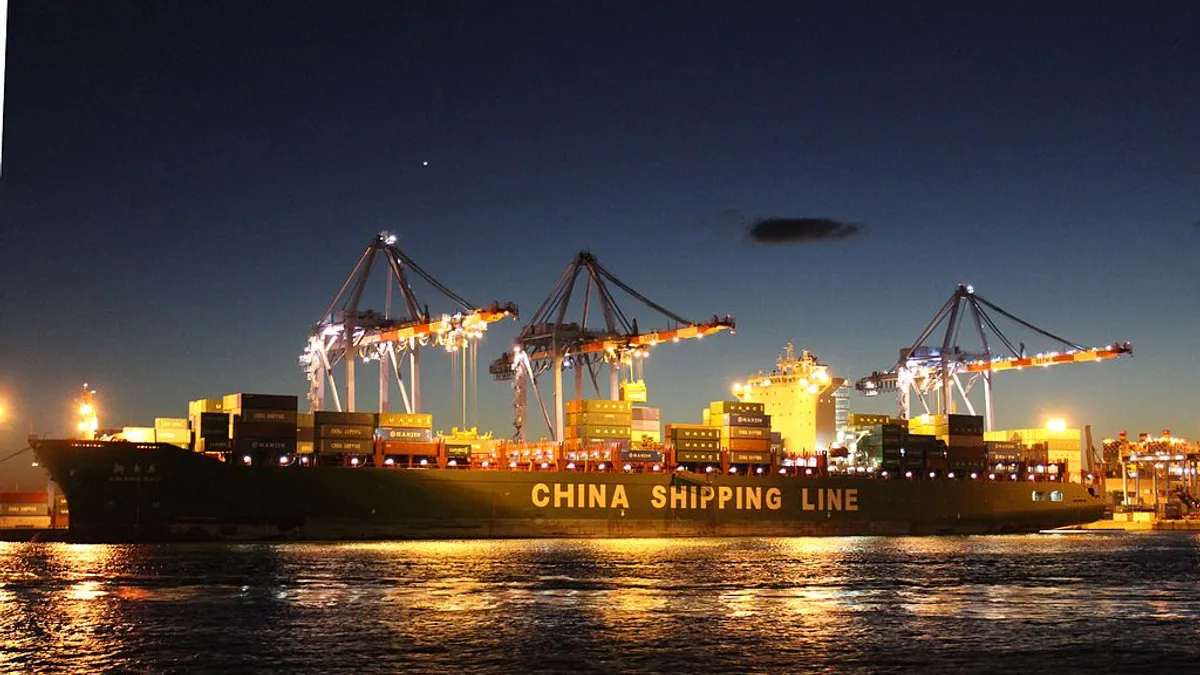Dive Brief:
- A trade representative for the United States asked China at a World Trade Organization (WTO) Council for Trade in Goods meeting on Friday to "halt" implementation of its import bans and restrictions on waste material, and "revise these measures in a manner consistent with existing international standards for trade in scrap materials," according to a report from Reuters.
- A representative from the European Union said China's decision to restrict scrap would reroute the material to other countries which may not have infrastructure in place for recycling — or to incineration and landfill. The U.S. said China was violating WTO rules by treating foreign and domestic waste differently and implementing an overly-restrictive trade policy.
- China also recently announced intentions to implement a 25% tariff on imports of aluminum waste and scrap. According to the Institute of Scrap Recycling Industries (ISRI), the U.S. exported about $1.17 billion worth, or 820,000 metric tons, of aluminum scrap to China in 2017, equaling about 50% of China's aluminum imports. ISRI says the 25% tariff would equal about a $300 million price burden on U.S.-China aluminum trade.
Dive Insight:
So far, 2018 has not been an easy year for the recycling industry, as developments over global trade play out. The year started with China's formal banning of 24 import types and a crackdown on those imports, and March 1 marked the formal start of a new 0.5% contamination standard. Trade groups, including ISRI, have expressed some serious pessimism over that standard, with Solid Waste Association of North America (SWANA) CEO David Biderman calling them "neither practical nor economically feasible."
Domestic trade concerns have been largely over paper and plastic — and appear more like a struggle than a catastrophe, as initially feared. While some states are suffering and disposing of recyclable material because operators can't find end-markets for material, other players are adjusting. Recent data showed countries like India, Vietnam and Malaysia increasing plastic scrap imports in 2017, indicating the development of new scrap markets. Others, including Waste Management, are looking to domestic solutions.
These moves by the U.S. and the E.U. at the WTO represent a forceful step in asking China to reconsider its stances on importing waste — though it is not yet clear if they will accomplish anything. China continually cites its goal of improving its natural environment, and says it must focus on its own waste management infrastructure, instead of importing other material.
While there has been some discussion and back-and-forth between the U.S. and China on the value of scrap vs. "waste," and the different definitions of the two, it seems increasingly clear that China is not backing down. A new "Blue Sky 2018" campaign, focused on customs enforcement, has already lead to multiple enforcement actions and the central government recently restructured and placed a continued emphasis on the country's environmental agencies.
But the proposed aluminum tariffs are an unexpected step by China. While President Trump's tariffs on steel imports are not expected to dramatically raise operating costs for the domestic industry, China's aluminum tariffcs could hit recyclers. The imports on steel will make it costlier for countries like China to send steel to the U.S.; China's tariffs on aluminum would make it costlier for U.S. recyclers to send aluminum to China.
Aluminum is a staple of many domestic recycling programs and acts as a "substantial source of revenue," according to ISRI. The escalating trade disputes between the U.S. and China may not be targeting the recycling industry, but as China moves to respond to U.S. enforcement actions, the already-strained sector may be caught in the crossfire.














